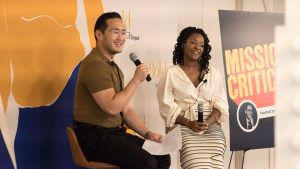It has been widely reported that Black entrepreneurs receive less than two percent of overall VC funding each year.
Following the George Floyd protests, companies were quick to pledge their support to underserved communities and startups, which saw a temporary increase in year-over-year gains.
However, by the end of 2022, overall VC funding dropped by 36 percent as inflation and interest rates surged, with Black businesses experiencing a disproportionate drop in support from the corporate landscape by a staggering 45 percent. Shouldered up to the historic rise in funding only a few years earlier, this drop is the largest year-over-year decrease Black entrepreneurs have seen over the past decade.
Fortunately, organizations and programs within the corporate and startup communities still exist with a clear mandate to bolster Black business owners in Canada.
A global leader with its roots and headquarters in Toronto, the DMZ is an industry-pioneering tech incubator on a mission to help founders build game-changing businesses by connecting them with resources, clientele, and communities. Having helped startups raise $2.5B in funding over the years, they’ve built a sturdy foundation that hundreds (800, to be exact) of founders have used as a launchpad for their startups—many of them BIPOC- and women-owned.
Under the banner of their Black Innovation Programs (BIP), the DMZ at Toronto Metropolitan University has come together with various partners to develop first-in-Canada programs aimed at supporting Black-owned tech startups.
Through the Social Impact Stream fuelled by Unilever Canada, Black social entrepreneurs entered a six-month virtual business incubator program where they gained insight on scaling, brokering key industry relationships, and building sustainable solutions to maximize their impact on Canadian communities. By the end of the program term, founders had the tools, mentors, and networks required to level-up their companies while accelerating their ability to create meaningful change and impact.
A similar DMZ-powered initiative, the Amex Blueprint: Backing BIPOC Businesses program, supported 200 entrepreneurs through the provision of mentorship and grant support. What did this entail, exactly? On top of a $10,000 grant, 200 business owners over the last two years were empowered by a mentorship program with the tools, resources, and community required to help their companies thrive.
Want to see the impact these programs had? Scroll through the gallery below to meet five unique BIPOC founders who are part of the DMZ community and learn about their respective journeys to success.
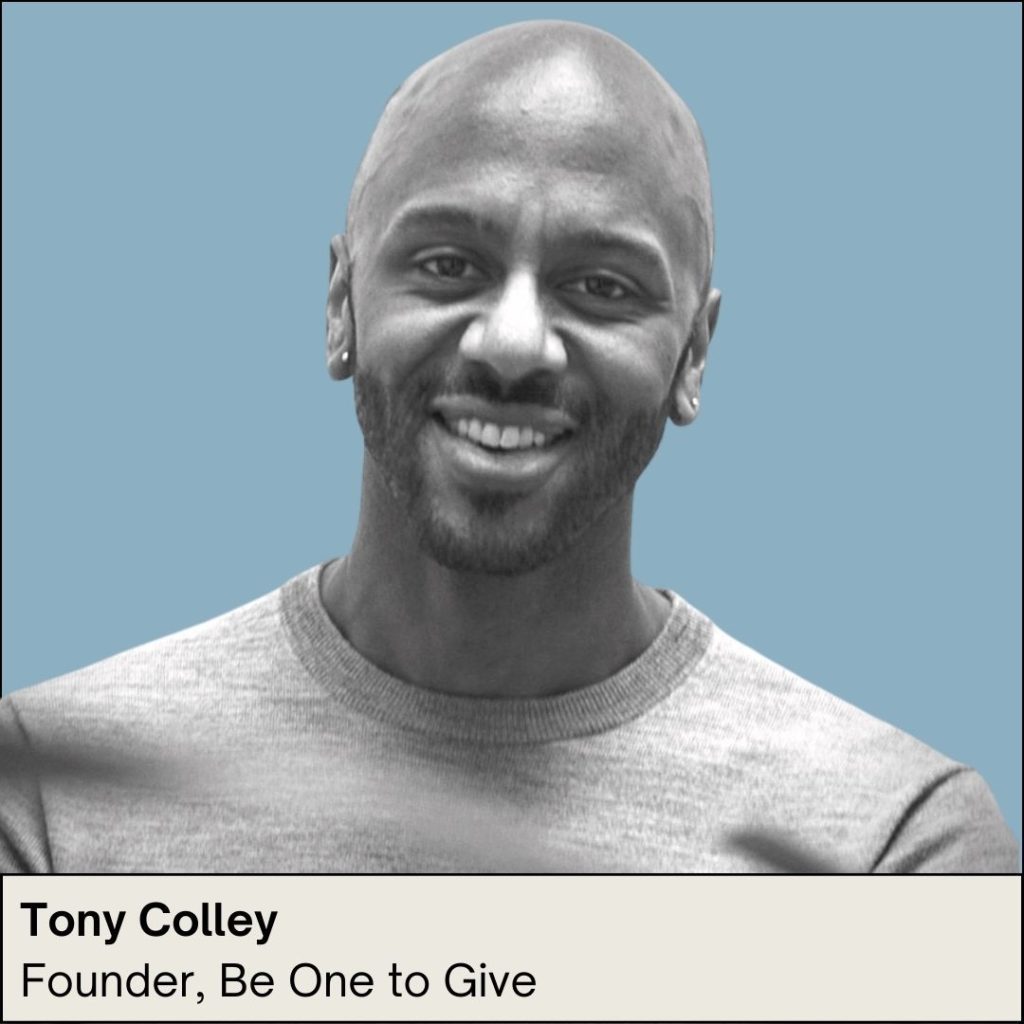

Program: Amex Blueprint: Backing BIPOC Businesses
What is your elevator pitch to the world?
Tony Colley: Be One to Give is an on-demand B2B delivery app for food business operators (FBOs) along the supply chain. We operate like UberEats, however we leverage technology and logistics to deliver surplus food with a limited shelf life to food insecure communities within two hours of receipt. We do this at $1 per pound using our packaging or $.50 per pound for prepackaged food. This includes login access, same-day delivery, and daily impact tracking.
Our circular technology helps FBOs surpass food waste reduction goals by capturing 100 percent of avoidable food waste from their daily operations. Redistribution provides greater ‘barrier-free’ access to surplus food, lowers the cost of food waste, reduces methane emissions and the overuse of our natural resources.
What was the impetus to starting your company or brand?
Tony Colley: In 2016, I found myself on social assistance and food insecure after a 23-year career, 16 of which was spent on Bay Street working for Scotiabank and CIBC managing commercial portfolios valued upwards of $4.5 billion.
After months of searching for employment, the only job I could find was part-time for a local caterer, and after my first event, we had over 100 boxed lunches left over.
Being food insecure, I took a few home for myself and redistributed the surplus to a nearby shelter. After more than a year of donations, I purchased a food delivery bag to simplify the process and immediately saw an opportunity to build a more circular solution to surplus food recovery.
How do you hope to empower food business operators through your business?
Tony Colley: We empower FBOs by helping them take active steps toward surpassing their environmental, social and governance (ESG) goals concerning surplus food.
Our service directly impacts their daily operations by eliminating avoidable food waste on demand. This will lower their carbon footprint and has the potential to reduce their operating costs by up to 20 percent. Organizations that use our service see benefits immediately, creating a trickle effect for their staff to (hopefully) reduce avoidable food waste in their own homes.
What is a misconception about the industry you are in that you hope to break through your work?
Tony Colley: The assumed liability when it comes to donated food. The Ontario Donation of Food Act clearly states: “A person who donates food or who distributes donated food to another person is not liable for damages resulting from injuries or death caused by the consumption of the food.”
The sooner policies around surplus food recovery are enforced at scale, the greater the opportunity for FBOs to take immediate action on integrating circular solutions like ours.
What excites you most about the work that you are doing?
Tony Colley: Being able to feed food insecure Canadians while combating climate change. The only thing that excites me more is amplifying our impact on a global scale.
We take pride in providing food-insecure communities with a healthy and nourishing meal from surplus food that was destined for a landfill. The process is seamless, with no barriers in place, which makes it easier for everyone involved. Offering a simple solution that will have a massive impact on the daily lives of both stakeholders is genuinely the best part.
Where do you think you have made the most impact in your company and community?
Tony Colley: We have an employment social enterprise within the company targeting women of colour and BIPOC/LGBTQ+ youth. As of today, my entire team is made up of women of colour, and I intend to continue building a team comprised of individuals underrepresented in tech.
Our primary objective is to provide greater access to surplus food. FBOs benefit from their social and environmental impacts by eliminating surplus food in their daily operations.
What have you learned about yourself as you’ve built your company?
Tony Colley: I learned that if you truly believe in yourself, anything is possible! I know that may sound cliché, but there’s no room for self-doubt when trying to make the world a better place. I didn’t plan to start this business, nor did I ever expect to own an app. Having done both at once without experience in the tech industry speaks to what everyone can achieve if they’re passionate about making a positive change.
My experience also plays a considerable role, considering everything I’ve done throughout my career has prepared me for this opportunity.
What has been the most challenging and rewarding part of building your business?
Tony Colley: The most challenging part is building the business itself. There are so many moving parts that are managed on a daily basis that it can be overwhelming at times. I love what I do, and it doesn’t feel like work to me. However, I look forward to the day when I can relinquish more of my daily responsibilities.
Ironically, the most rewarding part was the pandemic. I successfully launched the pilot in 2019 until the pandemic eliminated our pipeline. We weren’t prepared for such a positive response, so the lockdown gave me time to build the business and develop and test the technology without worrying about client onboarding.
The app launched in February of 2021 with an MVP that delivered a complete redistribution cycle and has since become the most data-driven circular solution to surplus food recovery.
If you could go back and give yourself advice, what would it be?
Tony Colley: I would tell myself to speak up whenever necessary, regardless of the parties involved and be honest and direct in my communication.
I tend to be more concerned with how my feelings and opinions would impact others, so to maintain order, I’ll keep them to myself to avoid upsetting people. I’ve since learned to speak up and deal with things in the moment rather than delay the inevitable. I don’t have this issue in my business as my voice is loud and clear. However, we all have personal lives and must ensure we care equally in both.
What has been your proudest moment as a business owner?
Tony Colley: My proudest moment is getting this far on my own with no practical experience in sustainability or financial support from investor dollars.
I started my research in July 2017, and the first time I received support was from the DMZ in September 2021. I placed first in their Black Innovation Program—Social Impact Stream’s pitch competition, and won several other pitch competitions shortly after that. This led me to being accepted into multiple tech accelerators raising close to $150,000 in a year. Most recently, I received a Clean50 Top Project award for our outstanding contribution to the clean economy and was named a New Founder to Watch in 2022, a list sponsored by the Telus Pollinator Fund.
We recently hit a milestone of redistributing over 25,000 pounds of food to more than 19,000 people, diverting roughly 95,000 pounds of methane from the atmosphere.
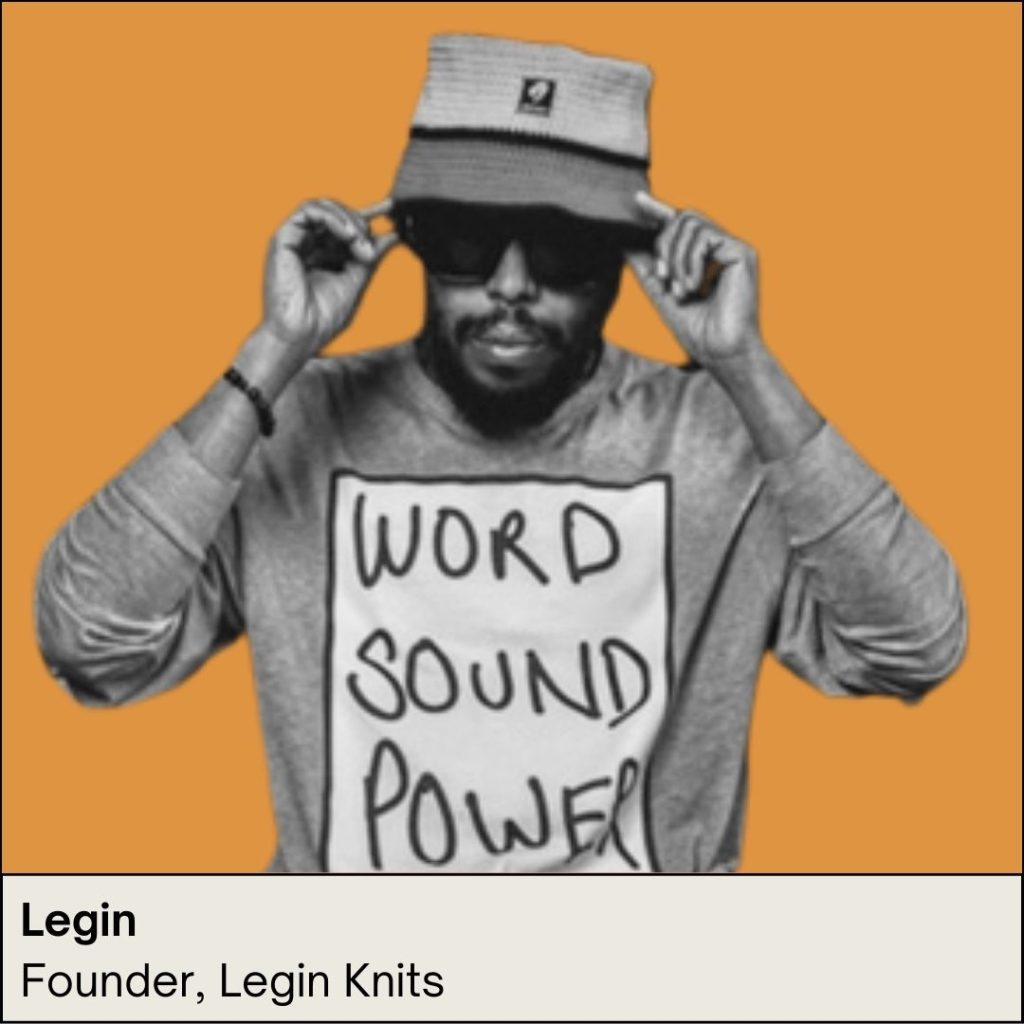

Program: Amex Blueprint
What is your elevator pitch to the world?
Legin: I am a crochet artist weaving consciousness and enduring values rooted in Rastafarian culture.
Uplifting people through high-grade aesthetics that outfit the world around us, we make one-of-a-kind luxury pieces using natural fibered yarns to offer high-quality products while being mindful of our environmental impact.
We also teach crochet in workshops for others to use creativity as a meditative practice. It’s proven that learning something new and applying creativity to your everyday life is essential to well-being.
Because we are the purveyors of fashion-forward products rooted in purpose, our products continue to be recognized in mainstream markets, all while we pioneer the art of crochet to bridge the gap between handcrafting and technology.
What was the impetus to starting your company or brand?
Legin: After learning how to crochet my first hat, I kept practicing and gifting them to friends and family. People eventually offered to pay, and I knew at this point we had something good and it was time to turn it into a business.
What excites you most about the work that you are doing?
Legin: For me, it’s all about creating and connecting with people and the planet. With my company, I can offer that through my product offerings but also through my teaching.
Showing people that they can be creative even if they feel they aren’t is like finding a hidden gem deep inside of their mind, body, and spirit.
Why do you think fashion and style can be powerful mediums of change and progress?
Legin: Fashion has always been a representation of the times, especially if we think about the ’60s, ’70s, ’80s, ’90s, or 2000s. Over the decades, fashion has had an enormous influence, whether through a social or political stance or personal style. Fashion is powerful and progressive.
What is unique about crochet as an art form?
Legin: Everything about crochet is unique, from the single hook used to create crochet to the many stitches you can learn. Artists have no restrictions when it comes to creating pieces, whether it be for fashion, art, or decor.
Are there any misconceptions that you are working to break through your business?
Legin: Absolutely, and I am at the forefront of making a change in many different ways. In an age where fast-paced technology leads our way of life, we often feel there’s no time or patience to pick up a skill in making handmade goods. Further, people can often forget that goods created with care and by hand come at a cost. Paying artists for their time and efforts needs to be valued.
Where do you think you have made the most impact in your company and community?
Legin: Teaching people how to crochet is the most rewarding part of my business, as much as I love seeing people buying and wearing my products around the world.
I get to breakdown what it means to be creative, and empower others to learn a new skill. Today, everyone wants to be perfect the first time they try something new, which creates a fear of failure. Practice and repetition can show you how to overcome that.
What have you learned about yourself as you’ve built your company?
Legin: I have learned that this is my calling and something I was destined for.
By building my company and seeing this through, I overcame obstacles and learned so much about myself, even after having so many moments of not knowing where to go and what to do next. Never give up on what makes you happy, and live your life chasing what that truly looks like for you.
What has been the most challenging and rewarding part of building your business?
Legin: The business side, as I came into this as an artist first. I’m not driven by sales but by the creative process. However, I overcame this. A business mindset now holds weight within me and through my company’s approach so it can grow and advance.
If you could go back and give yourself advice what would it be?
Legin: Take note of when you accomplished what you set out to achieve and look at resetting those goals. Dream bigger, plan bigger, and constantly surround yourself with people who challenge you to take things to the next level.
What has been your proudest moment as a business owner?
Legin: I learned how to crochet 27 years ago, and now in 2023 Legin Knits is a new, fresh and current company.
My business is stronger than ever before and continues to grow. As business owners, it can sometimes feel like a constant struggle. After many internal starts and stops, both creatively and on the business, it has been a journey that I would not take back because it is an integral part of who I am today.
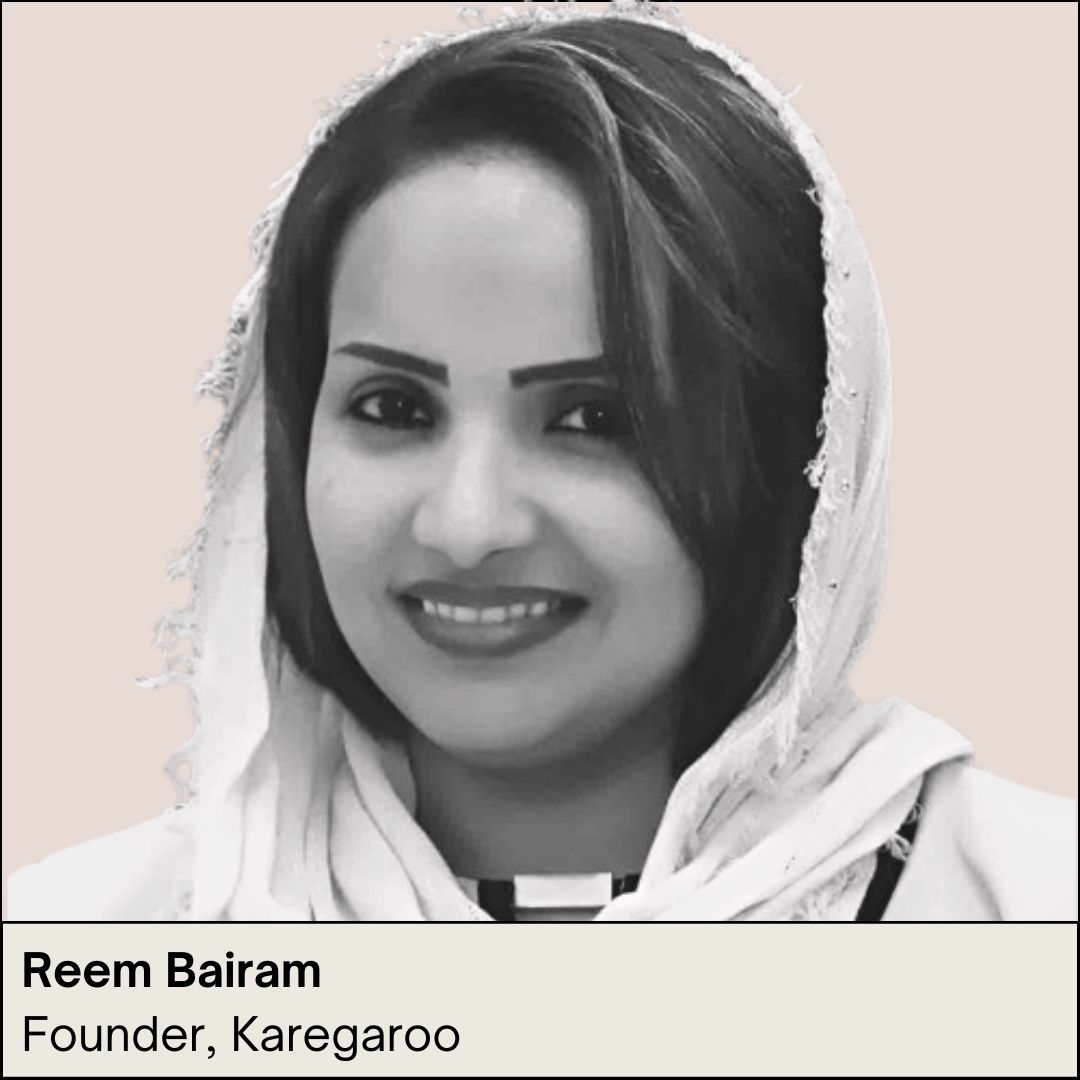

Program: Black Innovation Program Social Impact Stream, powered by Unilever Canada
What is your elevator pitch to the world?
Reem Bairam: Karegaroo is revolutionizing the way parents find and book quality childcare. Our platform provides on-demand and flexible childcare service that improve the lives of parents, caregivers and children.
We are committed to empowering women, especially refugees, to earn money and gain valuable work experience close to home. Parents can trust Karegaroo because our caregivers are nurturing, qualified, and dependable.
What was the impetus to starting your company or brand?
Reem Bairam: I arrived in Canada in 2019 as a refugee single mom with a young child (and another on the way) and no family support. I couldn’t access childcare services and couldn’t trust the private ones or afford them. This brought my attention to the challenges of childcare services in Canada, and the systemic barriers refugee women face.
Growing up in Africa, I was surrounded by a supportive and loving community. Now, my passion is to recreate that same atmosphere of connection, kinship, and family in Canada with this platform.
What do you think is the most impactful way of empowering refugees, especially refugee women?
Reem Bairam: The journey of refugee women is a testament to their strength and tenacity. Despite the many obstacles they must endure to settle in a new country and adjust to the system, their experiences allow them to develop a great deal of resilience.
To empower refugee women, it is necessary to understand their needs and the barriers they face. Often, existing systems overlook their needs and fail to recognize their potential. However, providing them with opportunities to participate in their new environment will help them settle and become contributing members of their new community and country’s economy.
What is a misconception about refugees that you are working to dispel through your business?
Reem Bairam: When I arrived in Canada, I was placed in a shelter and experienced many of the lived experiences refugee women are subject to. We are often underestimated and unrecognized in the job market, and systemic exclusion exists. For example, to be eligible for childcare subsidies, one must be enrolled in full-time classes or employed.
However, many refugee women need childcare on an ad-hoc basis to help with moving logistics like legal arrangements, finding housing and employment.
Through our business, we fill a need by offering on-demand affordable childcare and flexible employment opportunities, enabling refugee women to earn money and gain Canadian experience.
What excites you most about the work that you are doing?
Reem Bairam: Our founding team represents both target users: parents who need flexible childcare support and sitters who can provide childcare services during the early stages of the business. We have been in the exact shoes of those we aim to support.
Where do you think you have made the most impact in your company and community?
Reem Bairam: Our business seeks to solve a problem for all Canadians, not only refugees, and meet unmet needs in the market. As part of our social responsibility mandate, we will donate five percent of profits to our refugee-led community partners, The Syrian Canadian Foundation and Jumpstart Refugee Talent, to support refugee programming.
(The Syrian Canadian Foundation aims to empower newcomers and people of diverse backgrounds while promoting cross-cultural exchanges within Canadian society. Refugee Career Jumpstart Project is a Canadian non-profit focused on supporting the settlement of refugee newcomers to Canada through efficient and clear pathways to employment and entrepreneurial opportunities.)
What kind of problems are you trying to solve?
Reem Bairam: Karegaroo’s on-demand app improves access to quality and affordable childcare services in the community. Further, Karegaroo creates training, certification, and employment opportunities to support refugee women in the workplace.
According to Statistics Canada, the unemployment rate among refugees, particularly women, remains high, even after five and ten years of settling. Karegaroo creates opportunities that economically empowers refugee women and their families, increase agency, decreases unemployment, reduces poverty rates and creates opportunities for meaningful participation and integration into Canadian society.
What have you learned about yourself as you’ve built your company?
Reem Bairam: I am a persistent, patient and limitless individual. I have been able to motivate myself and adapt to any situation. I take risks, use them to challenge myself, and achieve my goals.
What has been the most challenging and rewarding part of building your business?
Reem Bairam: Building a diverse and dedicated team with limited funding was a stressful endeavour. Still, it provided an opportunity to assess the strengths and weaknesses of each potential team member and instill a strong sense of ownership.
The pandemic was one of the biggest challenges to establishing our business. Still, it drew attention to the flaws of the childcare industry, such as the lack of safe, reliable and affordable childcare options.
The most rewarding part of my work is seeing its real impact on families, especially refugee women. Securing a grant also reinforces the understanding and valuation of our impact and that our hard work is paying off.
If you could go back and give yourself advice, what would it be?
Reem Bairam: I would emphasize the importance of taking care of myself and taking regular breaks to recharge. I would also stress the importance of being prepared to make difficult decisions and having a solid team to help me reach my goals.
What has been your proudest moment as a business owner?
Reem Bairam: My proudest moment is when I think about all the challenges I’ve faced and how I have overcome them as a refugee woman. I am also immensely proud to have been selected by the Telus Pollinator Program as one of the top 15 women-led companies. This success is a testament to my hard work and determination
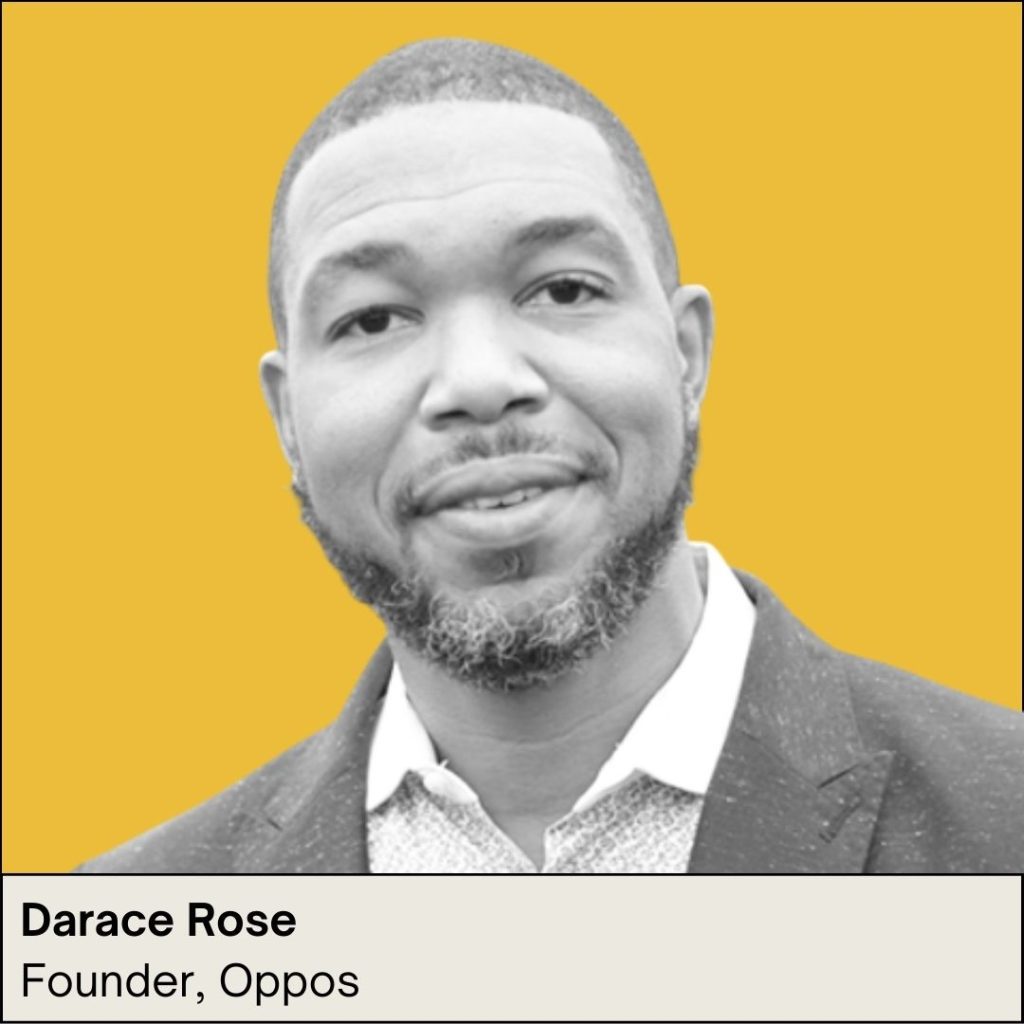

Program: Black Innovation Program Social Impact Stream, powered by Unilever Canada
What is your elevator pitch to the world?
Darace Rose: Oppos enables you to set up, maintain, and right-size your security needs without hiring staff. We scale to your needs with industry-leading experience, technology, and security experts.
What was the impetus for starting your company or brand?
Darace Rose: We identified a problem within most organizations around achieving various compliance frameworks, specifically understanding procedures and obtaining SOC2, ISO and HIPAA attestations.
What is a common misconception or misunderstanding around cybersecurity that you are working to dispel through your business?
Darace Rose: We strive to demystify the cybersecurity and IT regulatory compliance landscape to ensure clients are able to focus on their core business functions and, through our vCISO and advisory services, be rest assured that they are protected from cyber risk.
Why is cybersecurity increasingly becoming something that all businesses should be considering?
Darace Rose: Improving one’s business cybersecurity posture is no longer a nice to have; in 2023 this is an operational requirement. Obtaining a standard cybersecurity or regulatory compliance framework can provide several benefits to tech startups.
Increased Credibility: Certification of these standards can provide assurance to customers, partners, and investors that the company is committed to quality, security and privacy.
Improved Efficiency: The certification process involves a review of the company’s processes, which can identify areas for improvement. By implementing the recommended changes, the company can improve its efficiency, reduce costs, and increase customer satisfaction.
Regulatory Compliance: Compliance with standards such as HIPAA is mandatory for companies that deal with protected health information. Certification can help the company demonstrate compliance and avoid regulatory penalties.
Competitive Advantage: Certification can give the company a competitive advantage over other startups that are not certified. It can differentiate the company in the marketplace and attract customers who prioritize security and privacy.
Access to Funding: Investors and lenders may view certification as a sign of a well-managed and secure company.
What excites you most about the work that you are doing?
Darace Rose: Making the digital world a safer place for all.
Where do you think you have made the most impact in your company and community?
Darace Rose: Oppos has helped over 200 organizations meet and exceed various compliance frameworks, allowing more companies to operate in a safe and secure manner in today’s digital world.
What kind of problems are you trying to solve
Darace Rose: There are three main problems Oppos is tackling: cybersecurity assessments and services, network monitoring and alerting and making it simpler to complete cyber questionnaires to facilitate sales.
What have you learned about yourself as you’ve built your company?
Darace Rose:
Leadership skills: As the founder of a cybersecurity consulting company, I have to lead and manage a team of professionals who are responsible for protecting our clients’ data and networks. I have learned the skills and temperament to lead a team effectively and inspire them to achieve their goals.
Adaptability: The cybersecurity landscape is constantly evolving, and new threats and vulnerabilities are emerging all the time. As I built Oppos, I learned how to adapt to these changes to stay ahead of the curve.
Risk management: Cybersecurity consulting involves assessing and mitigating risks. While building Oppos, I learned how to assess risks and develop effective strategies for mitigating them.
Communication skills: I learned, and continue to learn, how to communicate with clients, employees and stakeholders regularly. I’ve also learned how to communicate complex technical concepts in a way that is easy for non-technical people to understand.
Technical expertise: I’m constantly learning and expanding my understanding of cybersecurity technologies and best practices.
Business acumen: I understand what it takes to run a successful business, including learning new skills in financial management, marketing, product development, and sales.
What has been the most challenging and rewarding part of building your business?
Darace Rose: The only constant is change. I’m lucky to have such a great team behind our service delivery and product development, both areas where I’ve been able to bring in subject matter experts onboard to ensure those critical items are managed properly.
If you could go back and give yourself advice what would it be?
Darace Rose: Start sooner and ensure to spend a lot of time vetting your staff and early partners. Also, attitude over aptitude, every time!
What has been your proudest moment as a business owner?
Darace Rose: Seeing team members step up to get things done without me so I can focus more on strategic growth opportunities and executing our future state objective.
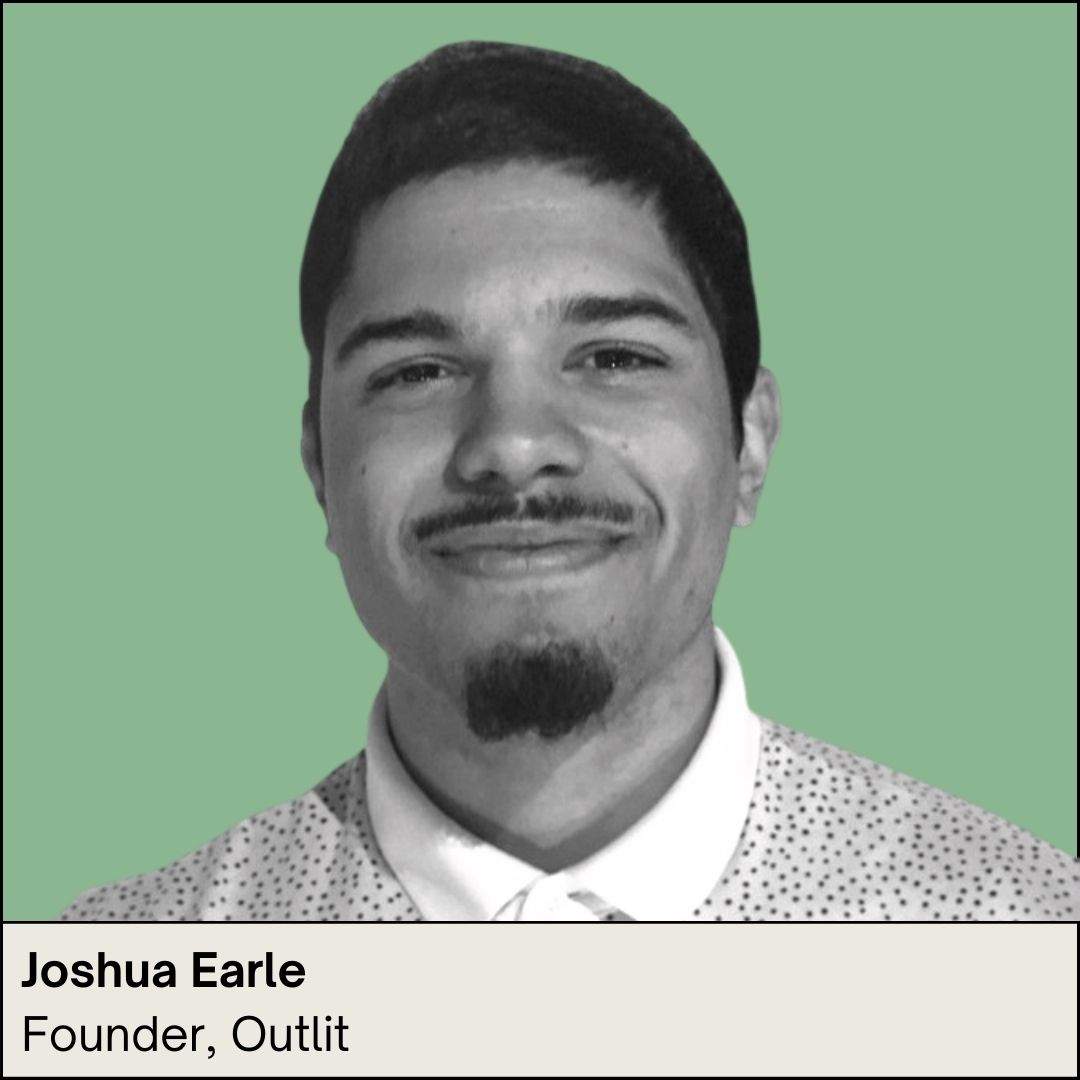

Program: Black Innovation Program Social Impact Stream, powered by Unilever Canada
What is your elevator pitch to the world?
Joshua Earle: Outlit is a mobile app that helps young people learn, explore and manage their finances.
What was the impetus for starting your company or brand?
Joshua Earle: We started our company because all three co-founders grew up in homes where we rarely discussed money management. This led to a limited understanding of personal finances until university. We wanted to create a solution when we discovered that many others were facing the same financial struggles.
How are you working to change people’s relationship with money and personal finance?
Joshua Earle: We understand that personal finance can be difficult to navigate, and people have different levels of understanding regarding financial literacy.
At Outlit, we’re addressing this by simplifying the learning process and making it more engaging through gamification. We’ve developed bite-sized exercises that help people learn about personal finance in a fun and interactive way. We aim to make financial literacy more accessible and help people build a stronger, healthier relationship with money.
What do you think people are most intimidated by when it comes to managing their personal finances?
Joshua Earle: Speaking to our users, we’ve learned that the most intimidating aspect of personal finance is that people simply don’t know what they don’t know.
With a lack of directions and resources, we’ve found that people never know the right first step to take, and as a company, we are trying to establish ourselves as the first step towards tackling your finances with more confidence.
In your experience, what is the most powerful way of changing people’s perspective on personal finance?
Joshua Earle: Highlight how it can improve overall quality of life. Learning how to manage money can help achieve financial goals and reduce stress related to money matters. Also, it’s essential to change the narrative that personal finance is just for math geniuses, anyone can learn the basics and take control of their financial situation.
What excites you most about the work that you are doing?
Joshua Earle: The most exciting part about working on Outlit is our opportunity to significantly impact how people interact with their finances.
We’re tackling a huge problem and slowly seeing positive daily results and indicators that we are getting closer to achieving our goal.
Where do you think you have made the most impact in your company and community?
Joshua Earle: As CEO, my main focus has been on finding ways to create opportunities by being resourceful. At Outlit, we understand how important it is to deliver education to our community, thats why we’ve formed partnerships with local schools.
We’ve integrated our app into the classrooms so students can learn about these essential topics early. We aim to positively impact education and help empower the next generation.
What have you learned about yourself as you’ve built your company
Joshua Earle: As I’ve been building Outlit, I’ve discovered how resilient I can be. Like any startup, we’ve faced many obstacles along the way, but giving up has never been an option. Even when it seemed easier to quit, we’ve stuck to our plan and persevered.
These experiences have taught me the value of staying committed and determined and how important it is to adapt to changing circumstances.
What has been the most challenging and rewarding part of building your business?
Joshua Earle: The most challenging part of Outlit so far has been creating organic growth. As a consumer application, it’s very valuable to us when current users speak highly on our behalf to their network.
I would say the most rewarding part of Outlit is when users tell us that they love our product and have implemented what they’ve learned into their daily life.
If you could go back and give yourself advice, what would it be?
Joshua Earle: I would tell myself that not everything has to be done alone. Make an effort to find similar people who share your values and work ethic. These people will be key in bringing your company to the next level.
Our proudest moment so far has been when we officially launched Outlit on the IOS store and Google play. It had been a long journey to get to that point, and seeing the reactions of people who have supported me since Outlit was just an idea, made it a cherished memory of mine.







